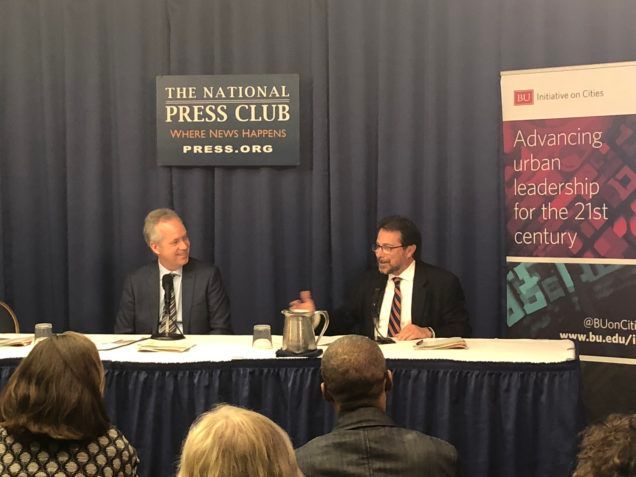2017 Menino Survey of Mayors Reports Housing and Climate Change as Top Challenges
On January 23, 2018, the Boston University Initiative on Cities announced the results of its 2017 Menino Survey of Mayors, a nationally representative survey of mayoral thoughts and challenges on today’s top issues. Three BU political science professors, Katherine Einstein, David Glick, and Maxwell Palmer, led the research by interviewing 115 mayors from 39 states this past summer.

The IOC shared parts of the research at the National Press Club in Washington, DC with city officials, media, and supporters from Citi and the Rockefeller Foundation. Director Graham Wilson kicked off the event by celebrating mayors as the cornerstone of democracy.
“You can see [mayors] working with other people, addressing issues, and solving problems,” said Wilson. “These people will restore your faith in democratic institutions.”
Housing Accessibility
Only 13% of mayors believe that their cities’ housing stocks are doing a good job of matching their cities’ needs, said researcher Katherine Einstein, which held true across different regions and costs of living. One of the most frequently cited obstacles to housing solutions is a lack of federal funds; cities often turn to public private partnerships or nonprofits to fund new projects. For residents of color, bank financing was a top obstacle for housing.
Mayor of Louisville Greg Fischer theorized housing is becoming “almost Darwinian. It’s like ‘May the strong survive and everybody else is on their own,’… But we value mixed-income cities.”
Climate Change
84% of surveyed mayors agreed that climate change is due to human activity, with 2/3rds of mayors supporting fiscal sacrifices to address it. Mayors cited reducing the number of vehicles on the road and upgrading to energy efficient infrastructure as the top two initiatives for cities to combat climate change. Mayor Fischer also noted that climate change should be viewed through an economic lens as well; potential residents don’t want to live in a city with bad air or infrastructure.
State and Federal Support
Initiatives like sanctuary cities have been heavily politicized with preemptive threats of withholding federal funding, said Mayor Fischer. As a primarily blue city in a red state, Fischer also feels preempted by the Kentucky legislature on topics like gun control of LGBT rights.
“The federal government has left the building. Are we in this together or not?” asked Fischer. “We’re stuck and we’re reliant on cities and mayors to think of these solutions.”
The Menino Survey asked mayors how much they believe they could combat the Trump administration’s policies. 74% of surveyed mayors believe they could change in police policy significantly, but only 15% believe they could change healthcare policy.
Cities as a Platform for Change
As local officials, mayors are the ones who know their community best and offer the most dynamic solutions, said Andy Salkin, Chief Operating Officer of 100 Resilient Cities by the Rockefeller Foundation.
“Mayors are in front lines making decisions even before many know it’s a challenge,” said Salkin.
The Menino Survey also revealed the benefit of city-to-city networks as a political signalling tool for cities to come together, said researcher Einstein. Mayor Fischer spoke about how he emphasizes lifelong learning, health, and compassion in his city.
“A city is platform for human potential to flourish,” he said.
Variation Between Mayors
When the results were presented to the Boston University community the following week, Einstein revealed what she’s learned about mayors after years of conducting this survey.
“I was really impressed for many of them how much they know about the nitty gritty city policies,” she said.
Researcher David Glick also noted the variation between mayors when it came to knowledge and willingness to discuss certain policy areas.
“Every year there are some areas that consistently, [mayors] have a lot to say and were pretty confident that it reflects their well-considered beliefs,” he said “For others, we were probably getting a newspaper kind of insert.”
The 2017 Menino Survey of Mayors emphasized the many similarities between mayors across the country on their goals and focus areas. From housing to climate change, mayors wanted to create a more accessible city for all residents. Though mayors feared a lack of state and federal support, they have found new funding avenues through private and nonprofit partnerships.